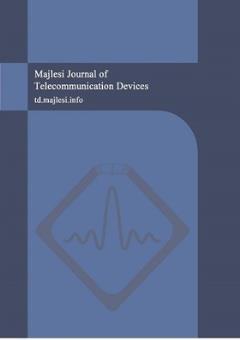Design of DDSM Modulator without Unwanted Tones with Effective Random Dither
Subject Areas : Majlesi Journal of Telecommunication Devices
Ghasem Hematipour
1
,
Seyed Ali Sadatnoori
2
![]()
1 - Deparment of electrical Engineering, Shoushtar Branch, Islamic Azad University, Shoushtar, Iran
2 - Department of electrical Engineering, Shoushtar branch, Islamic Azad University, Shoushtar, Iran
Keywords: Fractional frequency synthesizers, Digital sigma delta modulator, dither signal, undesirable tones.,
Abstract :
The output of a Digital Delta-Sigma Modulator (DDSM) is always a periodic signal and the input is constant. The frequency synthesizer is commonly used due to its flexibility and convenient frequency adjustment. This paper presents a new method to implement random dither in MASH 1-1-1 modulator. There are two different methods to remove unwanted tones from the MASH modulator output, which are deterministic and random. Deterministic methods include setting the initial conditions of the internal registers, using the first-module quantizer, and the HK-MASH structure. On the other hand, the random method involves applying a random dither signal to the circuit in different ways to eliminate the periodic behavior of the output string. Deterministic methods are not useful for most practical applications. In most practical applications, dither signal is a suitable method. In this article, the disadvantages of different dither methods will be investigated and a new vibration method for MASH sigma-delta modulators for use in fractional frequency synthesizers will be presented.
1] K. Hosseini, and M.P. Kennedy, “Mathematical analysis of a prime modulus quantizer MASH digital delta-sigma modulator,” IEEE Transactions on Circuits and Systems Part II: Express Briefs, vol. 54, no. 12, pp. 1105–1109, Dec. 2007.
[2] K. Hosseini, M.P. Kennedy (2011), “Minimizing Spurious Tones in Digital Delta-Sigma Modulators”, Analog Circuits and Signal Processing, Springer, New York.
[3] M.P. Kennedy, H. Mo, B. Fitzgibbon, “Spurious tones in digital delta-sigma modulators resulting from pseudorandom dither “ , journal of the Franklin Institute, vol: 352, No: 08, 2015, pp. 1-20.
[4] M.P. Kennedy, B. Fitzgibbon, K. Dobmeier, “Spurious tones in digital delta sigma modulators with pseudorandom dither“, in 2013 IEEE International Symposium on Circuits and Systems (ISCAS),Beijing, China, 2013, pp. 2747-50.
[5] S.A.Sadatnoori, E. Farshidi, S. Sadughi,. A novel structure of dithered nested digital delta sigma modulator with low-complexity low-spur for fractional frequency synthesizers, COMPEL - The international journal for computation and mathematics in electrical and electronic, 35(1), 157-171, (2016).
[6] S.A. Sadatnoori, E. Farshidi, S. Sadughi, A Novel Architecture of Pseudorandom Dithered MASH Digital Delta-Sigma Modulator with Lower Spur , Journal of Circuits, Systems and Computers, 25(7):1650072 · (2016).
[7] Y. Liao, X. Fan, Z. Hua, Influence of LFSR Dither on the Periods of a MASH Digital Delta–Sigma Modulator, IEEE Transactions on Circuits and Systems II: Express Briefs, 66 (1), 66-70, (2019).
[8] V. Mazzaro, M.P. Kennedy, Mitigation of “Horn Spurs” in a MASH-Based Fractional-N CP-PLL; IEEE Transactions on Circuits and Systems II: Express Briefs, 67 (5), 821-825, (2020).
[9] D. Mai, M.P. Kennedy, Analysis of Wandering Spur Patterns in a Fractional- N Frequency Synthesizer With a MASH-Based Divider Controller; IEEE Transactions on Circuits and Systems I: Regular Papers, 67 (3), 729-742, (2020).


